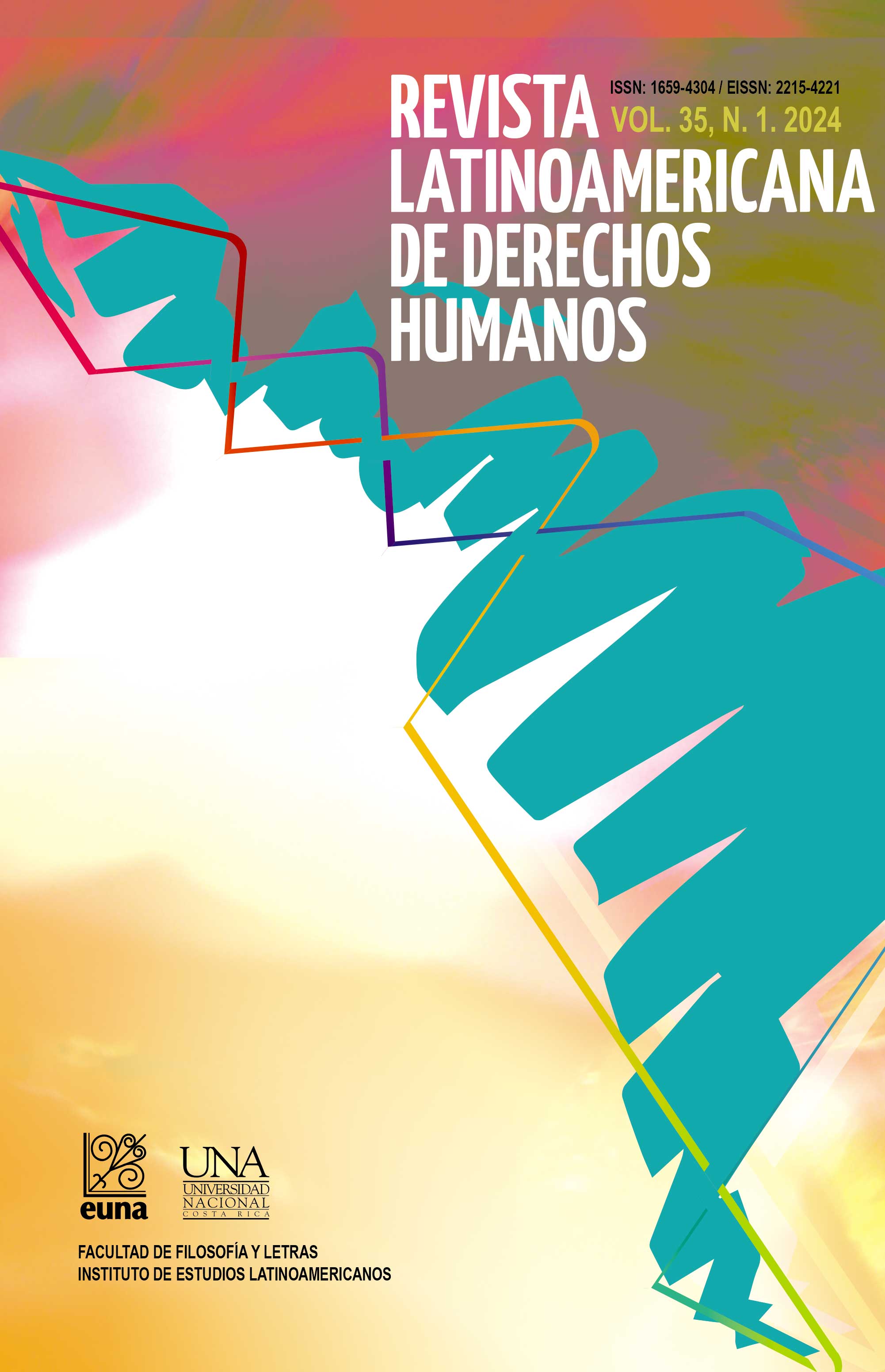Mnemonic Justice as an Ethical Minimum in the Dialogic Procedure of the Chamber of Recognition of Truth, Responsibility and Determination of Facts and Conduct at the Special Jurisdiction for Peace to Guarantee the Rights of the Victims in the Framework of
DOI:
https://doi.org/10.15359/rldh.35-1.9Abstract
The Special Jurisdiction for Peace (SJP) integrates a prior dialogic procedure in its institutional arrangement. This procedure aims to facilitate interactions between participants and victims to enhance contributions to the truth. This procedure faces problems that hinder the guarantee of victims' rights, conflicting with the principle of centrality of the victims. In this framework, we propose a mnemonic justice model as an ethical and procedural minimum at this stage of the process. This model can offer the participants tools to address to the needs of the victims in an effective manner.
References
Arrieta, J. A. P. (2011). Memoria, hermenéutica y justicia anamnética. Amauta, 9(17).
Congreso de la República de Colombia (2019). Ley 1957 “Estatutaria de la Administración de Justicia en la Jurisdicción Especial para la Paz”. Diario Oficial No. 50.976 de 6 de junio 2019.
Corte Constitucional. (2018). Sentencia C-080 de 2018. MP: Antonio José Lizarazo Ocampo.
Corte Interamericana de Derechos Humanos (IDH) (2012). Voto concurrente del Juez Diego García-Sayán. Caso Masacre de El Mozote y Lugares Aledaños Vs. El Salvador, 25 de octubre de 2012.
Ballesteros, S. (1999). Memoria humana: investigación y teoría. Psicothema, 11(n.° 4), 705-723. Recuperado a partir de https://reunido.uniovi.es/index.php/PST/article/view/7499
De Greiff, P. (2014). Informe del Relator Especial sobre la promoción de la verdad, la justicia, la reparación y las garantías de no repetición. Recuperado de http://daccess-dds-ny. un. org/doc/UNDOC/GEN G, 13.
Dussel, E. (1998). Ética de la Liberación en la Edad de la Globalización y de la Exclusión. Madrid: Editorial Trotta, S.A., p. 661. https://doi.org/10.7202/401177ar
Funkenstein, A. (1989). Theology and the Scientific Imagination from the Middle Ages to the Seventeenth Century. Princeton: University Press, p. 401.
Halbwachs, M. (2004). La memoria colectiva. Zaragoza: Prensas Universitarias, p. 192.
Mate, R. (2003). Memoria de Auschwitz: Actualidad moral y política. Madrid: Trotta, p. 272.
Reyes Mate, M. (2013). La piedra desechada. Madrid: Trotta, p. 312.
Rúa Delgado, C. F. (2016). La justicia anamnética como construcción complementaria del paradigma de justicia transicional: Una mirada desde el caso colombiano. Ius et praxis, 22(1), 455-492. https://doi.org/10.4067/S0718-00122016000100013
Ruiz, C. M. B. (2013). La justicia anamnética violencia, mímesis y memoria de las víctimas. Advocatus, (20), 319-335.
Sánchez Duque, L. M., et al. (2014). Justicia para la Paz: Crímenes atroces, derecho a la justicia y paz negociada. Bogotá: Dejusticia, p. 114.
Sección de Apelación, Jurisdicción Especial para la Paz (2019). Sentencia Interpretativa TP-SA-SENIT 1 de 2019 Sobre beneficios provisionales, régimen de condicionalidad y participación de víctimas, 3 de abril de 2019. Rad. 20183350080023, p. 156.
Uprimny, C. (2019). La Justicia de la Memoria: una propuesta desde la justicia mnemónica (Doctoral dissertation, Universidad del Rosario), p. 159.
Uprimny, R. Sánchez, L. y Sánchez, N. (2014). Justicia para la paz. Crímenes atroces, derecho a la justicia y paz negociada. Bogotá: Dejusticia
Downloads
Published
How to Cite
Issue
Section
License
El material que se publica en esta Revista está bajo una licencia “Creative Commons” 3.0 Costa Rica (CC, Reconocimiento-NoComercial-SinObraDerivada 3.0 Costa Rica (CC BY-NC-ND 3.0 CR) . Esto significa que el material publicado en la revista se puede compartir (copiar y distribuir) en cualquier medio o formato considerando que se debe reconocer de forma adecuada la autoría del material y la fuente, no puede utilizarse con fines comerciales y no se aceptan las obras derivadas (remezclar, transformar o crear a partir del material).








